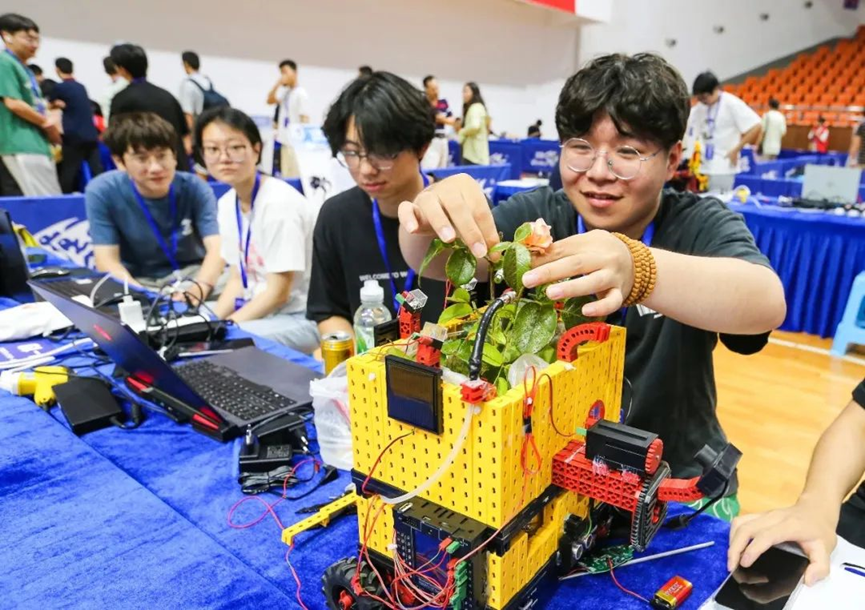08
NovZhang Donggang, Party Secretary of Renmin University of China and President of the National Academy of Development and Strategy, published an article titled “Promoting the Integrated Reform of Education, Science and Technology, and Talent Systems with Scientific Methods” in the “Current Affairs Report (Party Committee Central Group Study)”. The core points are as follows:
The Third Plenary Session of the 20th Central Committee of the Communist Party of China emphasized that education, science and technology, and talent are the cornerstones and strategic supports of Chinese-style modernization. It called for the deep implementation of the strategies to invigorate the country through science and education, strengthen the country with talent, and drive development through innovation, promoting the integrated reform of education, science and technology, and talent systems, establishing a new type of national system, and enhancing the overall effectiveness of the national innovation system. This is a continuation of relevant reforms since the Third Plenary Session of the 18th Central Committee of the Communist Party, marking a new stage in promoting education, science and technology, and talent development on the new journey.
As the core of science, technology, and innovation, universities bear important responsibilities and must deeply understand the significance of deepening the integrated reform of education, science, and talent. They should employ scientific methods, play a leading role in comprehensive education reform, and provide wisdom and support for building world-class universities with Chinese characteristics.
The article points out that deepening the integrated reform of education, science, and talent is profoundly important and necessary in the context of the new era. Since the 18th National Congress of the Communist Party, the Central Committee, with Xi Jinping at its core, has closely aligned with the development laws of education, science, and talent, advancing various reforms that have laid a solid foundation for China’s rapid economic growth and long-term social stability. Currently, China is at a critical juncture of Chinese-style modernization and must continue to promote reform, centering on innovation, to achieve a deep integration of the education chain, technology chain, and talent chain, stimulate new productive forces, and promote high-quality development. The article emphasizes that, in the face of a new round of technological revolution and industrial transformation, the virtuous cycle of education, science, and talent is crucial as they jointly support the stable development of the country’s economy, politics, culture, and society, enhancing its resilience against risks. To achieve the reform goals set for 2029 and 2035, priority must be given to developing education, science, and talent, ensuring the systemic, holistic, and coordinated nature of all reforms, thereby laying a solid foundation for the comprehensive construction of a modern socialist country.
Since the new era, the Central Committee with Xi Jinping at its core has continually deepened its understanding of the laws of reform, summarizing experiences from the reform and opening up, and forming important principles of reform that have led to new breakthroughs and progress in overcoming difficulties. The article emphasizes that deepening reform must adhere to the principle of maintaining integrity while pursuing innovation, inheriting basic principles such as the Party’s overall leadership, while also daring to innovate, motivating researchers, advancing the reform of the scientific and technological system, and stimulating the vitality of technological innovation. At the same time, it points out the necessity of adhering to a systemic perspective, coordinating the relationships among education, science, and talent, and emphasizing the interaction and complementary connections among the three. Through top-level design, it ensures the smoothness of the innovation chain, promotes collaboration and support among government, enterprises, and universities, and forms a complex system with multiple elements to ensure that education effectively supports the development of science and technology and talent. The article also proposes problem orientation as the core strategy of reform, emphasizing the need to confront prominent issues in the current fields of education, science and technology, and talent, such as weak basic research and insufficient conversion of scientific achievements. It aims to enhance the talent cultivation mechanism through deepening comprehensive education reform and scientific system reform, thereby improving the country’s competitive advantage in global scientific and technological competition.
The article underscores the foundational and strategic role of comprehensive education reform in national strengthening and national rejuvenation. The Third Plenary Session of the 20th Central Committee views the deepening of comprehensive education reform as an important guarantee for the overall deepening of reform, systematically deploying multiple reform measures for higher education, including building a high-quality education system, improving the mechanism for cultivating virtue and knowledge, and optimizing the layout of higher education. It states that implementing the fundamental task of cultivating virtue and knowledge is essential, emphasizing the need to nurture a new generation of individuals who are patriotic, dedicated, and responsible, while calling for the establishment of a comprehensive cultivation system that integrates morality, intelligence, physical education, aesthetics, and labor, promoting the integrated construction of ideological and political education to provide strong support for building world-class universities. Additionally, it stresses that higher education must serve national strategies and high-quality development, proposing to accelerate the construction of advantageous disciplines with Chinese characteristics and promote collaborative research to address major theoretical and practical issues facing the nation, thus supporting socio-economic development. Furthermore, the article mentions that universities should advance innovation in knowledge, theory, and methods, encourage interdisciplinary research among faculty and students, root themselves in excellent traditional Chinese culture, and construct an autonomous knowledge system. Lastly, it highlights the important role of higher education in international exchanges, advocating for talent cultivation and scientific research cooperation from a global perspective, enhancing students’ international competitiveness, and promoting the dissemination of Chinese culture and thought abroad, thus increasing the country's international discourse power. Overall, comprehensive education reform should be viewed as a key support for achieving the nation’s long-term goals.
(Translated by ZHANG Yuqing; Proofread by YANG Fanxin)
